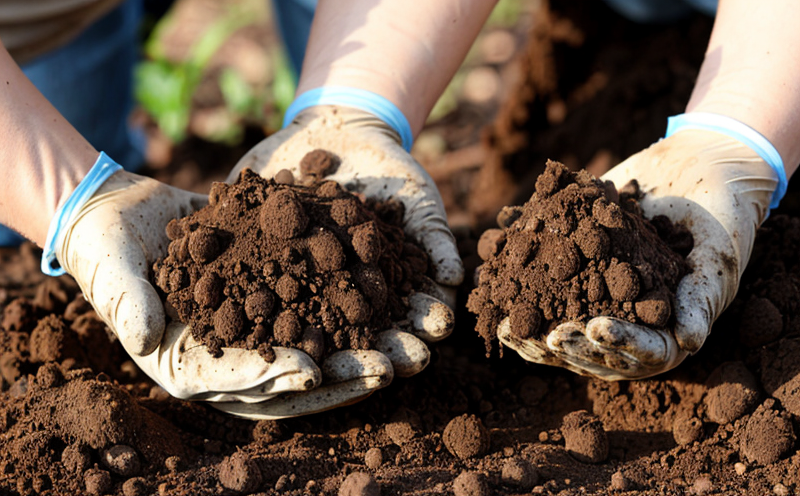ISO 17625 Soil Nitrate Reductase Enzyme Testing
The ISO 17625 standard provides a robust method for quantifying soil nitrate reductase enzyme activity, which is crucial in assessing the microbial and biological activity within soil samples. This enzymatic activity plays a pivotal role in understanding nitrogen cycling processes, an essential factor in agricultural productivity and environmental health.
Soil nitrate reductase (NR) catalyzes the reduction of nitrate to nitrite and further into nitrogen gases such as nitrous oxide and dinitrogen. By measuring NR activity, laboratories can provide insights into the efficiency of soil microorganisms in converting nitrate into less harmful forms. This is particularly important for assessing the potential for greenhouse gas emissions in agricultural settings or the effectiveness of bioremediation strategies.
The ISO 17625 test protocol involves incubating soil samples with a substrate that specifically reacts with NR, followed by quantification of the product formed. The method allows for precise determination of enzyme activity under controlled conditions, which is critical for ensuring accurate and reproducible results.
Our laboratory adheres strictly to ISO 17625 guidelines, employing state-of-the-art equipment and trained personnel to ensure reliable and consistent test outcomes. This includes the use of high-quality substrates and reagents, precise temperature control during incubation periods, and accurate measurement techniques for detecting the enzymatic products.
Understanding soil NR activity is vital in various fields such as agriculture, environmental science, and bioremediation research. It helps in optimizing fertilizer usage, mitigating nitrate pollution, and enhancing carbon sequestration capabilities of soils. By leveraging this knowledge, stakeholders can make informed decisions that lead to sustainable agricultural practices and reduced environmental impact.
Our service offers a comprehensive approach to ISO 17625 testing, providing not only the quantitative results but also interpretative insights into soil health based on these findings. This allows clients to better understand their data within broader ecological contexts.
Eurolab Advantages
At Eurolab, we pride ourselves on delivering exceptional service in biological and microbiological testing across various sectors including agriculture, environmental science, and biotechnology. Our ISO 17625 Soil Nitrate Reductase Enzyme Testing service is no exception to this commitment.
- Accurate and Reliable Results: Utilizing advanced analytical techniques and adhering strictly to international standards ensures that every test result is both accurate and reliable. This builds trust with our clients.
- Expertise and Experience: Our team of scientists and technicians are highly skilled and experienced in performing ISO 17625 tests, providing clients with the confidence that they are receiving expert analysis.
- Comprehensive Reporting: Alongside quantitative data, we offer detailed interpretative reports which help our clients understand the broader implications of their test results. This includes potential impacts on crop yields, environmental health, and compliance with regulatory requirements.
- Fast Turnaround Times: Understanding the importance of timely feedback, Eurolab strives to deliver results quickly without compromising on quality or accuracy.
- Compliance Assurance: Our services are designed to meet all relevant local and international standards, ensuring that clients remain compliant with regulatory bodies like ISO and EU.
With these advantages, Eurolab aims to support our clients in achieving their goals related to soil health assessment and management.
International Acceptance and Recognition
The ISO 17625 standard for measuring soil nitrate reductase enzyme activity is widely recognized and accepted internationally. This universal acceptance underscores its importance in soil biology research, environmental monitoring, and agricultural practice.
ISO standards are designed to ensure that products, services, and systems meet specific requirements for quality, safety, and performance. The ISO 17625 protocol provides a consistent method for quantifying NR activity across different laboratories worldwide, facilitating comparisons and collaborative research efforts.
The standard has been adopted by numerous countries as part of their national standards or guidelines. This international recognition ensures that the results obtained from ISO 17625 tests are valid and comparable globally. For instance, in agriculture, these tests can help determine the effectiveness of different fertilizer types on soil health across various regions.
In environmental science, understanding NR activity is crucial for assessing nitrogen cycling processes in ecosystems affected by human activities. The global acceptance of ISO 17625 allows researchers and policymakers to share findings more effectively, leading to better-informed decisions regarding land use practices and pollution control measures.
Use Cases and Application Examples
| Application Case | Description |
|---|---|
| Agricultural Research | Evaluating the impact of different fertilizers on soil microbial activity. |
| Environmental Monitoring | Detecting changes in NR activity after agricultural practices or pollution events. |
| Bioremediation Assessment | Monitoring the effectiveness of bioremediation strategies in reducing nitrate contamination. |
| Crop Yield Optimization | Identifying optimal soil conditions for maximizing crop yields by understanding microbial dynamics. |
| Regulatory Compliance | Ensuring adherence to environmental regulations related to nitrogen cycling and emissions. |
| Climate Change Mitigation | Tracking changes in NR activity as indicators of climate change impacts on soil health. |
| Research and Development | Developing new agricultural practices or bioremediation technologies based on NR activity data. |
In each of these applications, the precision and reliability provided by ISO 17625 testing are critical. By accurately measuring soil nitrate reductase enzyme activity, researchers and practitioners can gain valuable insights into complex ecological processes, ultimately leading to more effective environmental management strategies.





